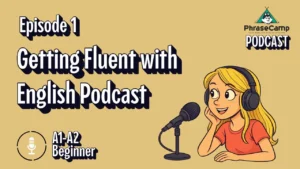Learn 120 practical English education phrases to confidently discuss your studies in everyday conversations. Perfect for learners looking to improve their fluency when talking about education.

Table of Contents:
- Introduction
- Why Discussing Education in English is Important
- Key English Phrases to Talk About Your Education
- a. General Education Questions and Answers
- b. Talking About Your School or University
- c. Discussing Subjects and Majors
- d. Describing Your Academic Achievements
- e. Talking About Extracurricular Activities
- f. Challenges in Education
- Practical Tips to Use These Phrases in Conversations
- Conclusion
- Call to Action
1. Introduction
Discussing your education is a common topic in various settings, from job interviews and academic environments to casual conversations with friends and colleagues. Being able to confidently talk about your academic background in English is essential for both social and professional success. This comprehensive guide will introduce you to 120 useful English education phrases that will help you discuss your studies clearly and confidently in any situation.
Whether you’re a current student, a recent graduate, or a professional looking to refresh your education-related vocabulary, these phrases will enhance your ability to express yourself fluently when talking about your educational experiences.
Also, check out a video we made below to shadow along if you are a visual learner.
2. Why Discussing Education in English is Important
Being able to articulate your educational background and experiences in English is crucial for several reasons:
- Professional Opportunities: Many job interviews involve discussing your education. Being fluent in this area can give you a competitive edge.
- Networking: Educational backgrounds often come up in networking events. Confident communication can help you make valuable connections.
- Academic Pursuits: If you’re considering further studies in an English-speaking country, being able to discuss your previous education is essential.
- Cultural Exchange: Education systems vary worldwide. Sharing your experiences can lead to interesting cultural exchanges.
- Personal Growth: Reflecting on and discussing your education helps you articulate your learning journey and future goals.
Mastering education-related vocabulary and phrases in English will boost your overall language proficiency and help you navigate various social and professional situations with ease.

3. Key English Phrases to Talk About Your Education
a. General Education Questions and Answers
These phrases will help you engage in conversations about your educational background:
- “Where did you go to school?”
- “I went to [school/university name].”
- “Did you enjoy your time in school?”
- “Yes, I enjoyed it a lot.”
- “No, it was quite challenging.”
- “What did you study?”
- “I studied [subject].”
- “Are you still studying?”
- “No, I graduated last year.”
- “Yes, I’m currently studying at [university name].”
- “What level of education have you completed?”
- “I’ve completed my bachelor’s degree.”
- “How long did your program take to complete?”
- “It was a four-year program.”
- “Did you study abroad during your education?”
- “Yes, I spent a semester in [country].”
- “What was your favorite part about your education?”
- “I really enjoyed the hands-on projects we did.”
- “Did you have to write a thesis?”
- “Yes, I wrote my thesis on [topic].”

b. Talking About Your School or University
Here are phrases to help you confidently talk about your school or university:
- “I went to a public school.”
- “I studied at a private university.”
- “I attended an international school.”
- “My university is well-known for its [subject] program.”
- “I graduated from [school/university name] in [year].”
- “The campus was really beautiful.”
- “I had great professors who were very supportive.”
- “The library at my university was one of the best in the country.”
- “We had excellent facilities for sports and research.”
- “The student community was very diverse.”
- “I really enjoyed the cultural exchange programs.”
- “The workload was intense, but I learned a lot.”
- “My university offered a wide range of extracurricular activities.”
- “The career services at my school were extremely helpful.”
- “I lived in the dormitories on campus for two years.”
- “Our university had state-of-the-art research facilities.”
- “The alumni network from my school is very strong.”
- “I participated in several internship programs through my university.”
- “The class sizes were small, allowing for more interaction with professors.”
- “My school had a beautiful mix of modern and historical architecture.”

c. Discussing Subjects and Majors
When the conversation turns to your field of study, these phrases will help:
- “I majored in [subject].”
- “I minored in [subject].”
- “I’m really passionate about [subject].”
- “My favorite subject was [subject].”
- “I struggled with [subject] at first, but I improved.”
- “I’m currently studying [subject] as part of my degree.”
- “I focused on [specialization] within my major.”
- “I’ve always been interested in [subject].”
- “I’m considering pursuing a master’s in [subject].”
- “I wrote my thesis on [topic].”
- “I took several courses in [subject] during my time in school.”
- “I loved the hands-on experience I got in [subject].”
- “My major required a lot of lab work.”
- “I had to complete a capstone project in my final year.”
- “I participated in several research projects related to my major.”
- “The curriculum for my major was quite interdisciplinary.”
- “I had the opportunity to work on real-world projects in my field.”
- “My favorite class was [class name] because it was so engaging.”
- “I found [subject] challenging but rewarding.”
- “I’m hoping to apply what I learned in [subject] to my future career.”

d. Describing Your Academic Achievements
Talking about your academic successes is important, especially in interviews or formal settings:
- “I graduated with honors.”
- “I was on the Dean’s List for three semesters.”
- “I received a scholarship for academic performance.”
- “I was the top student in my class.”
- “I received an award for my research.”
- “I completed my degree in three years.”
- “I was part of the honor society at my university.”
- “I presented my thesis at an international conference.”
- “I published a paper in a peer-reviewed journal.”
- “I was awarded the student of the year in my department.”
- “I completed an internship as part of my academic program.”
- “I earned a distinction in my final exams.”
- “I maintained a 4.0 GPA throughout my studies.”
- “I received a grant for my research project.”
- “I was selected for a competitive study abroad program.”
- “I won first place in a national academic competition.”
- “I was invited to be a teaching assistant for a course.”
- “I received recognition for my community service work.”
- “I was nominated for a prestigious academic award.”
- “I completed a dual degree program in four years.”

e. Talking About Extracurricular Activities
Your activities outside the classroom can also make a big impact:
- “I was involved in student government.”
- “I played on the university’s soccer team.”
- “I volunteered at local schools during my time in university.”
- “I was the president of the debate club.”
- “I participated in several cultural exchange programs.”
- “I was part of the university’s music ensemble.”
- “I organized several charity events.”
- “I took part in student exchange programs.”
- “I was a tutor for underclassmen in math.”
- “I volunteered for environmental conservation projects.”
- “I participated in various academic competitions.”
- “I interned with a nonprofit during my studies.”
- “I was a member of the university’s robotics team.”
- “I wrote for the student newspaper.”
- “I organized a TEDx event at our university.”
- “I was part of a research group studying climate change.”
- “I volunteered at the university’s career center.”
- “I was a peer counselor for international students.”
- “I participated in Model United Nations conferences.”
- “I helped organize our department’s annual symposium.”

f. Challenges in Education
Discussing challenges you’ve faced shows resilience and growth:
- “I had to balance work and studies, which was challenging.”
- “Adapting to online learning during the pandemic was difficult.”
- “I struggled with time management at first, but I improved.”
- “Learning a new language for my studies was a significant challenge.”
- “I found it hard to adjust to the different teaching style.”
- “Funding my education was a constant challenge.”
- “I had to overcome my fear of public speaking for presentations.”
- “Choosing between different specializations was a tough decision.”
- “I faced cultural shock when I first arrived at the university.”
- “Maintaining a work-life balance was difficult during my studies.”
- “I had to learn to ask for help when I was struggling.”
- “Dealing with academic pressure was stressful at times.”
- “I had to improve my critical thinking skills significantly.”
- “Adapting to group projects was challenging but rewarding.”
- “I struggled with imposter syndrome during my first year.”
- “Overcoming procrastination was a major hurdle for me.”
- “I had to develop better study habits to keep up with the workload.”
- “Balancing extracurricular activities with academics was tricky.”
- “I faced setbacks in my research, but I learned from them.”
- “Networking and building professional relationships was out of my comfort zone.”

4. Practical Tips to Use These Phrases in Conversations
Here are some tips to use these phrases naturally in conversations:
- Know your audience: Use formal or informal phrases depending on the context. For professional settings, stick with formal language.
- Practice with a friend: Role-play conversations about education with a friend or language partner to gain confidence.
- Watch academic interviews: Observe how professionals and students use these phrases in real-life conversations.
- Use language learning apps: Apps like Duolingo, HelloTalk, or Tandem can help you practice with other learners or native speakers.
- Record yourself: Practice saying these phrases and record yourself to improve pronunciation and fluency.
- Create context: Don’t just memorize phrases; understand when and how to use them appropriately.
- Start with basics: Begin with simpler phrases and gradually incorporate more complex ones as you gain confidence.
- Be authentic: Use phrases that genuinely reflect your experiences and opinions.

5. Conclusion
Being able to talk confidently about your education in English is a valuable skill that can open doors in both professional and personal settings. By mastering these 120 useful English education phrases, you’ll be able to speak fluently about your academic background, achievements, experiences, and even challenges you’ve faced.
Remember, effective communication is not just about knowing the right phrases, but also about using them appropriately and authentically. As you practice these phrases, focus on integrating them naturally into your conversations. With time and practice, you’ll find yourself discussing your education with increased confidence and fluency.
6. Call to Action
Now that you’ve learned these valuable phrases, it’s time to put them into practice! Here are some steps you can take:
- Challenge yourself to use at least three new phrases in your next conversation about education.
- Find a language exchange partner and practice discussing your educational background.
- Write a short paragraph about your education using these phrases and ask a native speaker for feedback.
- Watch our YouTube video on “Mastering Education Vocabulary in English” for more tips and examples.
- Share this article with fellow English learners who want to improve their education-related vocabulary.
Remember, consistent practice is key to fluency. Keep working on your skills, and soon you’ll be discussing your education in English with ease and confidence!

By mastering these phrases and following these tips, you’ll be well-equipped to discuss your educational journey in English, opening up new opportunities for academic and professional growth. Keep practicing, stay curious, and enjoy your language learning adventure!
Recommended Article
Here is a recommended article for you: “3 Essential ESL Hair Salon Conversations: Boost Your English Skills Today8 Powerful Advanced English Conversations for Real-Life Scenarios (ESL Learners)“


